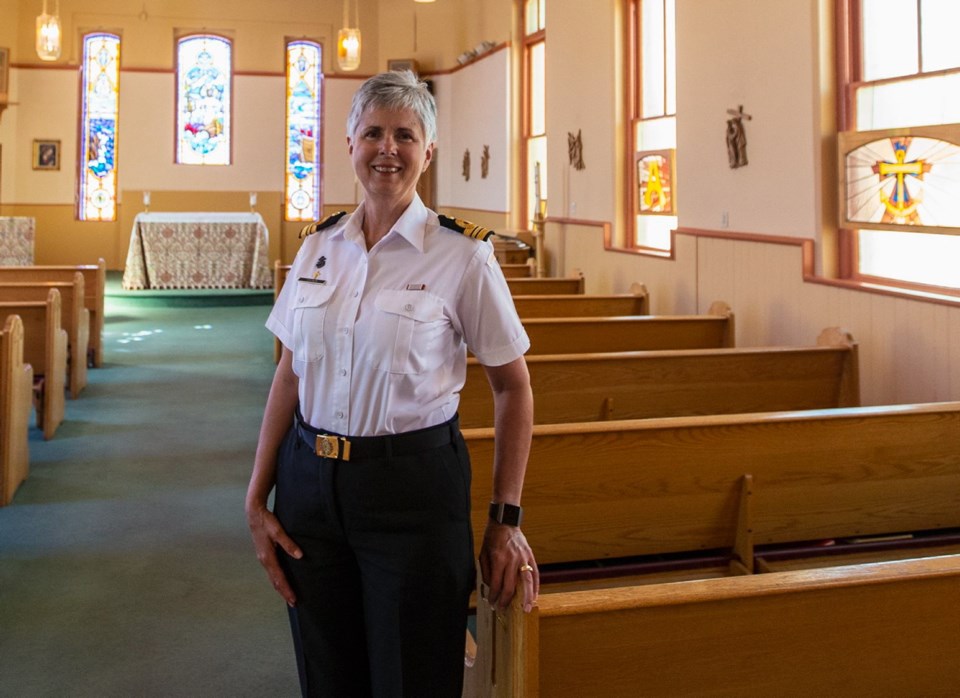When HMCS Protecteur caught fire near Hawaii, two things called Canadian Navy Lt.-Cmdr. Jeannine Friesen back on board: memories of her recent time as a ship’s crew member and God’s own instructions to minister to all people.
Friesen, an Anglican priest and now the senior fleet chaplain with Canada’s Pacific Fleet, said after hearing of the February 2014 fire on Protecteur, she wanted to assist, advise and advocate for a crew she knew personally. Less than two months previously, she had sailed as Protecteur’s chaplain.
But as a spiritual servant it was time to bring another message, even if the widespread multiculturalism of Canada’s modern Navy meant she had to be careful about invoking the name of Jesus Christ or even God.
“Those were early days and I knew they would need a someone to listen to them as they dealt with the impact of the fire,” Friesen said in an interview. “But what I hoped I could bring as a chaplain is a sense of hope and sense of God’s care for all people.”
It’s an example of the balancing act military chaplains are now called to perform in the Canadian Armed Forces. They are responsible for ministering to the spirit without offending anyone’s own individual faith, belief or even commitment to no religion at all.
“What we like to say is: ‘We minister to our own, we facilitate the worship of others and we care for all,’ ” Friesen said.
Friesen came relatively late to the Royal Canadian Chaplain’s Service, even if religious avocation came early. She attended divinity school in the 1980s and was ordained as an Anglican priest 33 years ago. But she has served only nine years with the Forces.
This despite an upbringing and life spent in close contact with the Canadian Armed Forces. Born in Saskatoon, she was a “military brat,” the daughter of an air force technician. She is also the wife of a military chaplain, now retired.
So, between the various postings of father and husband, Friesen has seen and come to appreciate the variances between parts of Canada and its people.
“One of the privileges of being in the military is getting a sense of how different the various parts of the country are,” Friesen said.
Now 58, and in charge of three full-time chaplains, she ministers to the spiritual needs of 5,700 military people attached to CFB Esquimalt. Much of the job is administrative, for example making sure every ship sails with its own “Padre.” In the forces all chaplains, men or women, are addressed by the masculine noun, and Friesen said she would not buck that tradition.
She also acts as a one-on-one counsellor, though if it becomes apparent that someone needs professional counselling, she refers them to the appropriate services. A big part of the job is being familiar with the myriad services and channels the Forces offer but can be hard to navigate, even for a member.
She also advocates at times. A forces member may have a personal crisis back home in a distant part of Canada. Friesen will act as a kind of advocate, building a case as to why compassionate leave may be appropriate.
The senior levels of command will also expect advice on occasion if issues of morale seem to be developing.
Friesen now rarely preaches, other than a few special moments. The modern Forces don’t hold church parade any longer, so any church attendance is purely voluntary, although CFB Esquimalt maintains two churches, one Roman Catholic and one Protestant.
With the Canadian Forces reflecting the country’s own demographics, she can easily find herself talking with a Muslim, a Jew or even a committed atheist.
So Friesen relates on a human level. As a mother of a son and daughter now attending university, some of her own toughest challenges were when duty forced her away from her family. That makes her no different from any other sailor, soldier or air force member.
“I can talk to them with some understanding of what they are going through,” she said.
“I’m literally in the same boat and experiencing the same kinds of challenges.”



